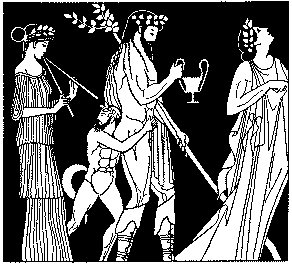Teaching these methods has become a cottage
industry sucking "talent" away from the mission fields to
the Athens of the
South. To see the Woodmont
Hills, "Look to the Hills" and the Zoe Group connection
Click Here. These groups specialize in training people to
manipulate the "audience" in church meetings. The goal is to
"lead the worshippers into the presence of God." In reality,
they are pushing body religion which, in the end, will
damage people and the seekers of the
next thrill will move on to the next venue.
Children believe that they are loving
"kitty" when they are really torturing the poor creature. In
the same way, the feel-good (or bad) preaching and music
begins by creating pain. For instance, the ear-shattering,
pulpit thumping preaching actually hurts. If this happened
in a production plant the speaker and band would be hauled
into court. Next, the body
tries to protect itself. In self-defense, it produces
endorphins and other drugs to deaden the pain. Because it
overdoes the pain, you get an extra fix of a
morphine-like drug. You then feel good and because fools
love to be fooled you believe that the feeling is the
speaker-singer-induced god moving around
in your body.
Remember the next time:
the sequence is hurt,
heal and hurrah. Those
with a spiritual mind will just say, "HUSH. The Lord is
already in His Holy Temple."
But the Lord is in his
holy temple: let all the earth keep silence before him.
Habakkuk 2:20
When the beautiful, talented, loud,
mechanics of complex harmony began their ancient pagan chant
you can be sure that you are being chemically and sexually
assaulted to force you into
"knowing god personally" so that the hair stands up on the
back of your neck and a cold chill sweeps up and down your
body like the hands of a skilled lover. You are under a drug
attack. This is why you run for your life before the closing
prayer can be finished to dismiss you from the spiritual
temple and out to the profane world. But on Sunday night you
will join the congregation "disguised as empty pews" to get
another fix.
This is identical to the loud,
charismatic, enthusiastic (meaning en theos o mania)
speaker who dances across the
stage, hands waving, feet keeping cadence. The voice
projected like a stone from a sling and the musical, sexual,
assualtive attack is identical to instruments. Among the
literate this produces nothing but a rustle of song books
during "act three." Without knowing why, the most ancient
pagan priests and priestesses understood that a form of
music which manipulates the body as well as the brain can
cause people to hallucinate and
actually believe that they are in the presence of the gods.
They were tapping into a natural, and often useful, form of
morphine. Like drug addicts, they will display hostility to
anyone who suggests that their rituals are neither Biblical
nor productive of spirituality. Look at the now-legal drug
being pushed on the religious "schoolyards":
Endorphins -
mediate pain at receptor sites. In an injury receptors
in skin make electrical signals that goes up the spinal cord
to the brain. The brain then evaluates pain by releasing
pain killers called endorphins which bind at opiate receptor
sites of neurons to mediate
pain. Endorphins effect the dopamine pathway that
feeds into the frontal lobe. These pathways inhibit the flow
of dopamine. Vast quantities of endorphins are released and
nerves are shut
off so more dopamine flows
through pathway to get to frontal lobe therefore
replacing pain with
pleasure. (Bliss Dictionary
Definition)
1. endorphin
(èn-dôr1fîn), any of a group of
NEUROTRANSMITTERS, affecting mood, perception of pain,
memory retention, and learning. Chemically similar to
opium-derived NARCOTICS, endorphins were searched for and
found in the 1970s after the discovery that MORPHINE works
by attaching itself to specific receptor sites in the brain.
Endorphins also attach to these receptors and appear to be
the brain's own natural painkillers. Besides behaving as
pain regulators, endorphins are believed to contribute to
euphoric
feelings such as the "runner's
high" experienced after prolonged exercise.
2. en dor
phin
(èn-dôr1fîn) noun Any of a group of
peptide hormones that bind to opiate receptors and are found
mainly in the brain. Endorphins reduce the sensation of pain
and affect
emotions. [ENDO(GENOUS) +
(MO)RPHIN(E).]
It is probably a fact that those who
have learned to manipulate "churches" to perform the
worship for the people or to lead them into the presence of
Deity understand that they can be drug pushers
without having the narcotics people down on their head. The
goal of many huge gathering cannot have the growth of the
church at heart. Rather, money and power drive those who
knowingly constrict the growth of the church by building
buildings which are going nowhere as their "located
evangelists" (as in "located travelling salesman.") are
going nowhere. The heart of a lot of religion, however
conservative, is a revival of the ancient mysteries.
"DIONYSUS, in
Greek mythology, god of wine (from new
wineskins) and vegetation, who showed mortals
how to cultivate grapevines and make wine.
- He was good and gentle to those
who honored him,
- but he brought madness and
destruction upon those who
spurned him
- or the orgiastic rituals of his
cult.
"According to tradition, Dionysus died
each winter and was reborn in
the spring. To his followers,
this cyclical revival,
accompanied by the seasonal renewal of the fruits of the
earth, embodied the promise of the
resurrection of the dead. (See Rubel Shelly / Randy Harris,
The Second
Incarnation, and their appeal
to the Aztec
renewal where up to 20,000
slaves of the watchtowers were sacrificed. Jubilee 99 will
be the next festival)
"The yearly rites in
honor of the resurrection of Dionysus gradually evolved into
the structured form of the Greek drama,
and important festivals were held in honor of the god,
during which great dramatic
competitions were conducted. The most important festival,
the Greater Dionysia, was held in Athens (Nashville is
Athens of the
South) for five days each spring. It was for this celebration that the Greek
dramatists Aeschylus, Sophocles, and Euripides
wrote their great
tragedies. After the 5th
century BC, Dionysus was known to the Greeks as
Bacchus.
At similar events:
"You might hear
many poor wretches of
sophists, shouting and abusing
each other, and their disciples, as they call them,
squabbling; and many
writers of books reading
their stupid
compositions, and many
poets singing their poems, and many jugglers
(buffoons) exhibiting their marvels, and many
soothsayers giving the meaning of prodigies, and then a
thousand
rhetoricians twisting
lawsuits, and no small number of traders driving their
several trades. (William Barclay) See the wineskin/music/effeminization
theme
The Jubilee 99 or the wineskin or
Seeker Service model pretends that it is the old "decadent
and deliterious" churches who are the rigid wineskins which
cannot stretch enough to pass positive judgment upon all
religious groups. However, this is the effect of being under
the influence of the "new wine." They do not love the truth
and are being sent a strong delusion that they believe a
lie. Rather than reforming or restoring shortcommings they
subconsciously (unconsciously) repeat an eternal pattern.
That is, their new form of worship proves that it is
they who are becomming rigid and will
steal buildings
and run away founding members by filling the pews with ancient pagan
rituals which will always chase away the rational
(spiritual) believer.
Barclay clearly helps
define Jubilee 99 as a restoration of Dionysus rituals --
which were quite identical to the Feast of Tabernacles under
Dionysus when Jesus condemned them as "musical children"
just playing silly and embarassing games.
"There is a further irony:
although the last tragedy of the last canonical tragedian
puts the god of
theatre back into theatre,
restoring Dionysos as the centerpiece of the festival of the
City Dionysia, this restoration shows unmistakable signs of
instability, uncertainty,
even self-doubt.
"As he approached his native city
Thebes, Pentheus the
king, who had no respect for the new worship,
forbade its rites to be performed.
"But when it was known
that Bacchus was advancing, men and women, but
chiefly the
latter, young and old, poured
forth to meet him and to join his triumphal march.
|
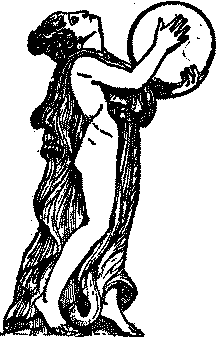
|
-
Fauns with
youthful Bacchus follow;
-
Ivy crowns that
brow,
-
supernal As the
forehead of Apollo,
-
And possessing
youth eternal.
-
Round about him
fair Bacchantes,
-
Bearing
cymbals, flutes and
-
thyrses, Wild
from Naxian groves
-
of Zante's
Vineyards,
-
sing delirious
verses."
Longfellow
|
|
"A fourth-century BC hymn in honor of
Dionysos contains the invocation: 'Come to us, King
Dithyramb, Bacchus, god of the holy chant.'"
Dithurambos, Dithyramb "comes to be used of a
Dionysiac song which possessed some infectious
quality that led his votaries to take it up as a
ritual chant. Later it became the subject for
competition at Dionysiac festivals, and with its
formalization it lost any spontaneity it may have
possessed originally." "At the beginning of the
fifth century BC tragedy formed part of the Great
Dionysia, the Spring festival of Dionysos
Eluethereus. Three poets completed, each
contributing three tragedies and one satyric play.
The latter was performed by choruses of fifty
singers in a circle, dressed as satyrs, part human,
part bestial, and bearing before them huge replicas
of the erect penis, as they sang dithyrambs." -
John M. Allegro, The Sacred Mushroom and the Cross.
|
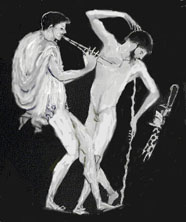
|
When the god of music, dance and drama
is being restored under the guise of "new wine in a new
wineskin" it is because that
specific tribe of illegal
preachers trained in phylosophy and the theater are perhaps
lost beyond redemption and keep the music loud and long to
help them forget or to give them confidence like whistling
through the cemetary:
"It is symptomatic of
structures that have lost their
elasticity,
becoming too
rigid to accommodate further
development, to intensify the
semantics of self-reference as a sort of
final act of self-reassurance.
"The patterns of
self-reference by drama to drama as
we see them in The Bacchae of
Euripides reflect a crisis in the
very genre of tragedy,
in the
context of drastic changes in Athenian society toward the
end of the fifth
century;
the prospect is one of abrupt confrontation and loss." -- Nagy, Pindar's Homer p. 388
In the recapitulation or "drama" of
the ancient wineskin religion of Dionysus, the symptom of
the "end of the millenium bug bite" proves that it is
those promoting singing, playing, dancing and drama in an
attempt to "move into the presence of the gods"
who are (1) focussed upon self-reference, (2)
experience millenial nervousness that the "now but not yet
kingdom" cannot be found and (3) experience the prospect of
confrontation and loss.
These
are the very people who have constructed a new wineskin out
of an old, died-of-itself billy goat skin. It will not
stretch enough to fit the "water of the Word" which Christ
put into "ceremonially pure vessels of clay."
Scholars of drama,
ancient and modern, are quick to admit that when people --
especially males -- put on the masks of drama there is a
real and present danger of gender-leakage or gender crossover. This, too, is
consistent with the Dionysus tragedy. In the old form of Dionysus worship, the king
doesn't recognize the god of wine as his cousin
and:
"His initial sense of
unfamiliarity gives way to invasive feelings of familiarity,
of maddening
closeness. Repulsion gives way
to fatal
attraction. The
magnetic force
of this attraction is the essence of Dionysos as the god of
theatre, as the inner source
of tragedy itself. It is the lure of tragedy that draws
Pentheus into his own fatal ordeal. The tragic is what
causes Pentheus to desire to be
tragic.... The wonders of the god Dionysos pull people
together to celebrate these wonders by competing with
each other in song and
dance.
"The speech of the
herdsman says it all: "once upon a time, we humble herdsmen
came together in the countryside, drawn by the wonders of
the god to sing and dance in
competition."
Of course, such assemblies for song,
dance and drama are actually ritual combat: the little hills
trying to rise above the mountains in polemic combat --
everyman's Armeggedon if you
will:
"There is a single Greek
word for such coming together and competition,
agôn.
The word means, literally, "coming together." In the same
breath, it means "competition," since any coming together is of and by itself the
same thing as competition.
Nietzsche understood this fundamental equation in ancient
Greek song culture when he spoke of the "spirit of
Agôn," der agonale Geist. The spirit of competition is
reflected in a derivative of this Greek word
agôn,
antagonism.
It is also true that the word for
weapon and instrument in both Hebrew and Greek are the same.
A carnal weapon is really a carnal musical instrument which
is a lifeless musical instrument. Therefore, as in most of
the Psalms "with an instrument" or "to the musical director"
the writer -- often David -- is doing verbal combat with his
personal enemies even singing for God to kill little babies.
However, after Christ came to end the Baal - Yahweh
(prophets of Baal and Asherah versus Elijah):
"Then to all mankind He
calls out, 'Let every
spirit praise the Lord,'
because He rules over every spirit He
has made. In reality, man is an instrument for peace, but
these other things,
"if anyone concerns
himself overmuch with them, become instruments of
conflict, to inflame the
passions.
"The Etruscans, for example, use the
trumpet for war; the Arcadians, the horn; the Sicels,
the flute; the Cretans, the lyre; the
Lacedemonians, the pipe; the
Thracians, the bugle; the
Egyptians, the drum; and the
Arabs, the cymbal.
"But as for us, we
make use of one instrument alone: only the Word of
peace by whom we a homage to
God, no longer with ancient harp or trumpet or drum or flute
which those trained for
war employ." (Clement of
Alexandria, 190AD The instructor, Fathers of the church, p.
130)
Many poor males believe that they can
hire a "manipulator" to bring the audience into the presence
of God. And one poor female creature believes that her dance
team is the mediator between
God and the audience: "When we dance we become the platform
upon which God lands."
-
-
"As dancers we
have a
calling to be signs and
symbols to the people
of God and to the world. We are to
manifest His
character in every step that we dance
and every gesture that we
make.
-
- In
our priestly duties as
dancers we have an incredible
respo(n)sibility.
- We
not only bring the offerings of the
people to God, but as
we dance we also
- provide a platform for
God to step
down upon in order to
touch His people
with His
presence....
-
- I
see us as a
bridge between
God and
man, and bridges
do get walked upon! So if we are to be
anointed vessels of
honor used for His
glory, then we must not shy away from the
fiery trials of purification that will
surely come our way. As our lives are, so
will our dance be! Please Click Here Before
You Endanger Your Soul.
|
-
This is identical to the ancient
"Helio-port" at the top of the Tower of Babel or the
Zoe-Sophia team or neo-pagan purification rituals or the
Dionysus chorus which was often restricted to real
women:
-
- "The backdrop to the central
figures of Pentheus and Dionysos is the
chorus of The
Bacchae, female devotees of the god. The word bakkhos (masculine)
or bakkh (feminine) designates someone who has been
possessed by the god, who literally has the god
within. (The word entheos, meaning "having the god [=
theos] within," is the
ultimate source of our word enthusiasm. (Philo called
it en thuso
mania and Paul called it
madness. ks) The feminine plural of this word,
bakkhai, is Latinized as "bacchae,"
whence the name of the tragedy, Bacchae.
-
- The
play is named after the chorus, that is,
- the
song-and-dance
ensemble who stand for the true
followers of the
god.
"These women (whatever their
gender ks) are Lydians and hence foreigners,
accompanying Dionysos as he travels all
the way from distant Lydia to the center of Hellenism,
Thebes. Their possession by the god is benign,
unlike of the women of Thebes, who are led by Agave,
mother of Pentheus.
Any time you see a "musical worship
team" or anyone standing over (rather than sedentary as Paul
demanded) you know that they feel that you are not
competent to move into the presence of God by yourself.
However, they are competent -- for a price, always for a
price. This gives rise to the Musical Worship Minister or
the Worship Facilitator (manipulator) in the Jubilee 99 scheme of
things. These people on the dole without authority can load
the backs of the congregation with another buddy who has no
shame and goes on the dole -- replacing Christ. One mediates
in one direction by bringing his words to replace Christ's
words; the other mediates by lifting or "ascending" the
audience into the presence of god. A scam what am, eh what!
Jubilee 98 featured a benign
mediating team. However, their name is not unlike the violent
Bacchae:
Halal (h1984) haw-lal'; a prim. root; to be clear
(orig. of sound, but usually of color); to shine; hence to
make a
show, to
boast; and thus to be (clamorously) foolish; to rave; causat. to
celebrate; also to stultify: - (make) boast (self), celebrate, commend, (deal, make), fool (-
ish, -ly), glory, give [light], be (make, feign self) mad
(against), give in marriage, [sing, be worthy of] praise,
rage, renowned,
shine.
Seeing the hand waving, prancing
across the stage under the shadow of four Asherah poles,
from the remoteness of my computer screen, Jubilee 98 looked
like a halal event which is identical to a last-stage Dionysus event. Trying to mediate for the "audience" or to
elevate self up to "stand over" (not sedentary) in violation
of Paul's command is taking on the role of Lucifer. Lucifer
got his name from the praise teams of lost Jews:
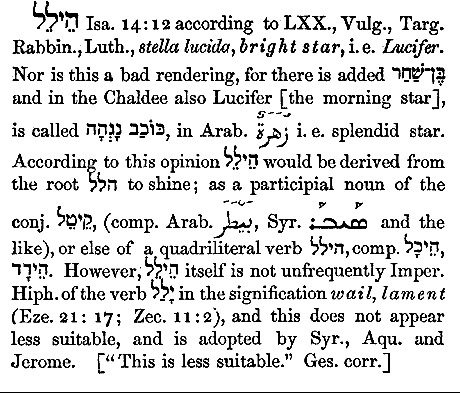
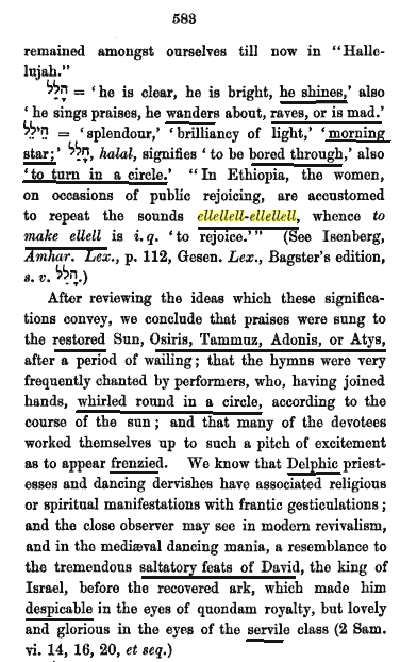
Heylel (h1966) hay-lale'; from 1984 (in the sense
of brightness); the morning-star: - lucifer.
Thy (Lucifer's) pomp is brought
down to the grave, and the noise of thy
viols: the worm (maggots wearing purple robes) is
spread under thee, and the worms cover thee. Isaiah
14:11
How art thou fallen from
heaven, O Lucifer, son of the morning! how art thou cut down
to the ground, which didst weaken the nations! Isaiah
14:12
For thou hast said in thine heart, I
will ascend into heaven (to mediate and accept worship
with his musical instruments), I will exalt my throne above
the stars of God: I will sit
also upon the mount (har as in har-meggido) of the
congregation, in the sides of
the north: Isaiah 14:13
I will ascend above the
heights of the clouds; I will be like the most High. Isaiah
14:14
(The king of Tyre as a Lucifer type
sang his song of the prostitute with the harp because he
wanted to be remembered -- as a male)
Lucifer (from halal) would sit
at the high places (surrounded by asherah poles) of the
congregation. Congregation
is:
Mowed (h4150) mo-ade'; (2 Chron. 8:13), mo-aw-daw';
from 3259 (to
give in marriage); prop. an
appointment, i. e. a fixed
time or season; spec. a
festival; conventionally
a year; by
implication, an assembly (as
convened for a definite purpose); technically the
congregation; by extension, the place of meeting; also a
signal (as appointed beforehand): - appointed (sign, time),
(place of, solemn) assembly, congregation, (set,
solemn) feast, (appointed, due)
season, solemn (-ity),
synagogue, (set) time (appointed)
This is why the trumpets or loud
rejoicing were absolutely outlawed for the assembly of the
congregation. Alarm is:
Ruwa (h7321) roo-ah'; a prim. root; to mar (espec.
by breaking); fig. to split the
ears (with sound), i. e.
shout (for alarm or joy): - blow an
alarm, cry (alarm, aloud, out), destroy, make a joyful noise, smart, shout (for joy), sound an alarm,
triumph.
The "musical children" or the Jewish
clergy tried to force Jesus into the feminine or effeminate
Greek chorus to lament. This would have had Heylel triumph over Jesus. However, Psalm 41
identifies the center of the effort against Jesus as Judas
whose bag was "for carrying the mouthpieces of wind
instruments).
This triumph, like that forbidden in
the Israelite congregation, was:
Thriambeuo
(g2358) (mean. a noisy iambus, sung in
honor of Bacchus); to make
an acclamatory
procession, i.e. (fig.) to
conquer or (by Hebr.) to give victory: -
(cause) to triumph (over).
"Narrative poetry was written for
rhythmical
recitation, or chant, with
instrumental
accompaniment; and Lyrical
poetry for rhythmical melody, or singing. It must be borne
in mind that in ancient music--which in this differs widely
from modern--the rhythm of the melody was identical with the
rhythm of the text. The lyric poetry was to be sung; the
poet was musician and composer, as well as author. To this
day a poet is said conventionally to "sing." Allen and
Greenough Latin Grammar 609.e
For 'tis thy friends that
make thee choke with rage. Aristotle, Politics.
For brothers' wars
are cruel, and They that too deeply loved, too deeply
hate.
Of course, Dionysus or Bacchus was
recognized as a representative or presence of Satan or
Lucifer. He was antichrist because he took the worship which
should never be given to a musical worship team or a
"preacher of note." The illustration below represents the
end-time rituals of those who began as simple "musical
worship teams." However, if we understand those men given to
drama we will understand---
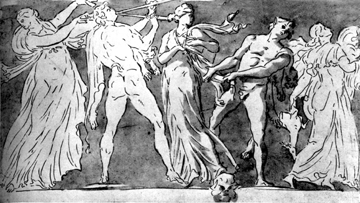
Heard the drums and pipes at Jubilee 98 around
what looked like Asherah Poles. Lots of hand waving -- by
the men.
According to Plato, when women were
allowed to participate in the rituals it was the ultimate
put-down. By picking a token musical worship team who would be the stand in for all of the
women, the rest were consigned to the audience. The lesson
of the Dionysus, wineskin revival is that when you fail to
recognize the true God, He sends you strong delusions so
that you believe a lie. You then turn from the Biblical text
as the only source of sermon and song. The last and most
visible sign which God always sends is to turn you to
feminine and effeminate song, dance and drama. The result is
not spirituality but, in the whole theatrical world, the
familiarity and close association results in
gender-crossover: the male music minister runs away with the
male organ player (a true story). A little knowledge of this
ancient form of pretend worship would make any literate
person blush and "turn in their key to the executive
bathroom."
It was recognized that before the
performers of musical rituals ascended to the stage they had
already fallen into a form of madness or frenzy. That is,
they were "out of themselves." How else could you account
for grown men swaying, smiling, waving hands, nodding,
winking and "speaking" in a totally unnatural voice while
pretending to be in the presence of the God of the universe
and speaking to Him on behalf of the incompetents? These
people cannot grasp that God is an "adult" and is capable of
hearing us in just plain english prose. They have to be mad!
That is what halal means!
"The frenzied excesses of
the Theban women are contrasted with the moderation of the
Lydian Bacchae. Their positive
possession belongs in the sphere of ritual,
which
highlights the moderation that the god can give mortals who
recognize his true nature.
"The negative possession of the Theban
women belongs in the sphere of myth, which contrasts the
frenzied
excesses experienced by those
who fail the challenge of
recognizing the god.
The singing and dancing of the chorus of
Bacchae, who stand for the Lydian
women, is fundamentally an act
of ritual, of worshipping the god.
"This ritual of bacchic
moderation is predicated on the myth of bacchic
catastrophe (homosexual familiarity from gender crossover
during song, drama and dance). Such a balance of
moderation and catastrophe
brings to life the theatre of Dionysos.
"One of the greatest of all Greek
dramas, The Bacchae
powerfully dramatizes the conflict between
the emotional and rational
sides of the human psyche.
(See Romans 7 and 8 to see that Paul understood this
conflict)
- When the people of Thebes
deny the existence of the god Dionysos,
- he punishes them
by unleashing the full force of female sexuality,
- thereby destroying social order
and driving them to certain tragedy.
This conflict between moderation
and excesses: between the emotional and rational sides of
the brain is yearly fought out in little Jubilee festivals
all over the world. This deliberate conflict is caused by
the failure to understand the true nature of God in the face
of Jesus Christ and the nature of His "in your heart"
kingdom. The punishment for this failure is a religion of
song, dance, drama and secular preaching.
Mysticism Defined - John
MacArthur
"Mysticism includes the idea that
direct knowledge of God or ultimate reality is achieved
through personal, subjective intuition or experience apart
from, or even contrary to, historical fact or objective
divine revelation."
"Johnson, a professor at
West Texas State University, elaborates: When we speak of a
mystical experience we refer to an event that is completely
within the person. It is totally subjective . . .
Although the mystic may experience it as having been
triggered by occurrences or objects outside himself
(like a sunset, a piece of music, a
religious ceremony, or even
a sex act), the mystical experience is a totally
inner event. It contains no
essential aspects that exist
externally to him in the physical world . . . A mystical
experience is primarily an emotive event, rather than a cognitive one
. . Its predominant qualities have more to do with emotional
intensity, or 'feeling tone' than with facts evaluated and
understood rationally. Although this is true, it alone is a
woefully inadequate way of describing the mystical
experience. The force of the experience is often so
overwhelming that the person having it finds his entire life
changed by it. Mere emotions cannot effect such
transformations.
"Furthermore, it is from
this emotional quality that another characteristic results,
namely, its 'self-authenticating' nature. The
mystic rarely questions the
goodness and value of his experience. Consequently, if he describes it as giving
him information, he rarely questions the truth of his newly
gained "knowledge". It is this claim that mystical
experiences are "ways of knowing" truth that is vital to
understanding many religious movements we see today. [Our
Sufficiency in Christ, John MacArthur, Jr., Word Publishing,
1991]
The newly released book by
Travers and Jewel van der
Merwe, "Strange Fire: The Rise of Gnosticism in the Church"
provides us a detailed explanation of the Gnostic heresy and
how it has adapted to the modern church in various new
perversions of doctrine.
"When a high value is
placed on personal experiences or revelations, Scriptures
are then unscrupulously twisted
and misquoted. We find those
who believe the feelings of a congregation must be
hyped-up in order to `feel' the Presence of the
Lord or else the church is
thought to be `dead.' Instead of
music being
used to worship and glorify God, it is used as a means of `connecting' or
`feeling' the Presence of God. (p.
89)
"Could Promise Keepers be
adopting some of these `experiential' Gnostic beliefs
and practices? Chris Corbett noted, in the "Heritage"
article, that "given PK's emphasis on emotional
highs and revelations, and their apparent
disdain for precise
theology, critics wonder where
the next `vision' could take the movement - and how it could
influence the lives of the Christian men being tethered to
it through PK's growing arms." Unfortunately, Corbett found
that "PK officials would not comment on the Vineyard..."
Rise of Gnosticism's Revival With
Music
When Paul condemned an ancient form of
gnosticism in the church at Corinth he was not condemning
knowledge of the Bible. Rather, he was condemning knowledge
or insights which came from mental intoxication from real
wine or music-induced rituals which brought one into contact
with the gods by being in contact with his key agents:
"A key component of the
Gnostic experience is the alteration of consciousness. Because the Gnostic is subjectively driven,
the perception of God becomes something that hinges on
feelings rather than faith. In order to improve upon the
feelings, the use of additional mechanisms to
create moods, especially the use of music, is frequently brought in. Van der Merwe's
explain:
"Worship is an integral
part of the Christian faith. Sometimes feelings of ecstasy
are experienced. The Presence of God is rightly
acknowledged by true worship.
However, when emotional feelings become the doctrine of God's Presence, then
God has been reduced to a "gnosis" form of
Presence. For many, the doctrine of `knowing the Presence of
God' is sought in a subjective experience. An emotional
experience, especially a repetitive one
during a worship service, if not kept in proper perspective
or check, can lead to an altered state of
consciousness in which the capacity for rational reasoning
is greatly reduced.
At this point the
congregation is open to
delusion and can easily be led
astray. In many charismatic groups an altered state of mind
is explained as `getting into
the Spirit' or as a
manifestation of the presence
of God. Uncontrolled spiritual
feelings transcend sound scriptural rationalism and give
rise to the doctrine of `the Presence of God'
built on experience. (p. 90-91, "Strange Fire")
The almost frantic running to and fro
learning the latest methods of mind control through song,
instruments, dance and weird preaching may be an end-time
loss of faith in the revealed Christ. Many of these people
believe that they are the revealers of a new paradigm or
"wineskin" into which all of the world's religions will fit.
Short of actual morphine and alcohol, music is the next best
alternative to alter the minds of the "worshippers" to make
them feel certain things and thereby validate the new
"Jesus."
"For instance, Pastor Ryle
believes his dreams and visions are prophetic revelations directly from God. In a sermon entitled "Sons
of Thunder" he preached at his church, Boulder Valley
Vineyard in Longmont, Colorado, July 1, 1990, he
alleges that God is about to
anoint Christian musicians
with the same "anointing" that was originally given to the
Beatles. He says God told him in a dream:
"I called those four lads from
Liverpool to myself. There was a call from God on their
life; they were gifted by my hand; and it was I who anointed
them, for I had a purpose, and the purpose was
to usher in the
charismatic
renewal with musical revival around the world." RESURRECTING PAGAN RITES The revival of pagan myths and rites includes
the reintroduction of
the Sacred
Prostitute concept for women.
Part 2: THE SACRED PROSTITUTE (From the December 1995 issue
of Christian Conscience magazine)
"Sacred" prostitution and sacred music
have always been a matched pair. In the modern church the
incidence of consumated "worship" is probably small.
However, the "promise" and
hope is implicit in the choice of talent, beauty
and dress. Paul understood that the "stand up - speak up"
role for women would be an open admission of her devotion to
body and talent and not to God Who is Spirit and does not
need entertainment. According to Plato when women were
permitted in these roles it was actually a show of contempt
Albert Barnes and the Wine Music
Connection
When the mind becomes dull from taking
the alcohol drug, the tavern keeper knows that he can
arrouse you with loud music
or a stand-up commedian.. However, this allows you to get drunker and
the booze merchant gets richer. You are not only under the
control of the alcohol drug but also the music drug:
"The music was designed to
counteract the effects of inebriety; for as
wine discomposes the body and
the mind, so music has the
power of soothing them, and of restoring their previous
calmness and tranquility." (Barnes quoting Plutarch, Isaiah
p. 129)
The music in the taverns injects other
drugs which keeps the customer alert and drinking. Remove
the music and you just have the drunks. If you want them to
return you had better have the best entertainment in town.
This also describes the ancient pagan temples. In the end,
the "excitement" from both wine and music produced
withdrawal symptoms when the drugs quit flowing--usually
before Sunday night services.
It is also useful for "dumb, dirty,
ignorant sheep" or for the mentally deranged like Saul.
Researchers have discovered that the low, bass tones can
nail your seat to the pew while the high, female or
effeminate voices can create great anxiety which makes you
want to run for your life. The combination of LF/HF can
physically, emotionally and mentally derange and then kill.
Job and Musical Star
Worship
Of those addicted to star worship
where music helped you up the steps of the Towers of Babel,
the book of Job notes the connection between music and
telling the ethical God to get lost:
They send forth their
little ones like a flock, and their children dance. Jb
21:11
They take the timbrel and
harp, and rejoice at the sound of the organ. Jb 21:12
They spend their days in wealth, and in a moment go down to
the grave. Jb 21:13
Therefore they say unto
God, Depart from us; for we desire not the knowledge of thy
ways. Jb 21:14
This, of course, explains a form of
astrology where fertility was the result of song and dance
while telling God to get lost. And this is the reality in
most songs and sermons. The discovery of the stretched
string was believed to be magic and that the gods or demons
actually lived within musical instruments. How else could
you account for the deranged feelings which allowed the
soothsayer (preacher) to echo her own voice from an old
wineskin and prove to you that it was the presence of the
gods. Jubilee 99 will feature an expert on Chage Agentry to
life up the Name of the Lord when He said that He is lifted
up in "righteousness and justice." The methods of change
are, too, ancient paganism.
"Farther still, the whole
Pythagoric school produced by certain appropriate songs, what they called exartysis, or
adaptation; synarmoge, or elegance of manners; and epaphe, or contact,
usefully
conducting the dispositions of the soul to passions
contrary to
those which it before possessed.
"For when they went to bed, they
purified the reasoning power from the perturbations and
noises to which it had been exposed during the day, by
certain odes and peculiar
songs, and by this means
procured for them tranquil sleep, and few and good dreams.
"But when they rose from bed, they
again liberated themselves from the torpor and heaviness of
sleep, by songs of another kind. Sometimes, also, by
musical sounds
alone, unaccompanied with
words, they healed the passions of the soul and certain
diseases, enchanting, as
they say, in reality....After this manner, therefore,
Pythagoras through music
produced the most beneficial
correction of human manners and lives. Iamblichus (300 A.D.)
"The true, highest melody,
however, is that which is sung
without any voice. It resounds
in the interior of man, is
vibrating in his heart and in
all his limbs. Isaac Loeb
Peretz (1912).
"A certain number of musicians were
gathered at a feast given by a
great sovereign who took care to place them
according
to their degree
of mastery of
their respective arts,
"when a man of wretched appearance,
clad in rags, entered. The master of ceremonies raised him
up above all the participants, whose faces expressed their
evident disapproval. Wishing to display the man's merit and
calm his guest's anger, the master asked him to let them
hear a sample of his art.
"He took out some pieces of wood which
he had with him, set them out before him and stretched
strings over
them. Then he set these
strings vibrating and performed
an air that made all those
present burst into laughter
because of the pleasure, the
joy and the well-being that took possession of their souls.
"Then he
changed his tuning and played another air which made
everyone weep for the tenderness of the melody and the
sadness which settled in their hearts.
Then he
changed the tuning, and played another air which
plunged everyone into
slumber; so doing he rose,
went out and was never heard spoken of again.
(The Brethren of Purity of
Basra )
Isaiah and Israel's Wineskin
Musical Worship
The best possible negative model of
the new wine and music revival of paganism is in Isaiah
five. God had provided them with everything but the people
neglected God's "vineyard" and turned to daily religious
festivals:
Woe unto them that rise up
early in the morning, that they may follow strong drink;
that continue until night, till wine inflame them Isa 5:11
(Note: this is contaminated wine or grain beer which has
natural or added hallucinogens. A high level of
music-induced endorphins can also cause
hallucinations.)
And the harp, and the
viol, the tabret, and
pipe, and wine, are in
their feasts: but they regard
not the work of the Lord,
neither consider the operation of his hands. Isa 5:12
Therefore my people are gone into
captivity, because they have no
knowledge: and their
honourable men are famished, and their multitude dried up
with thirst. Isa 5:13
Therefore hell hath
enlarged herself, and opened her mouth without measure: and
their glory, and their multitude, and their pomp, and he that
rejoiceth, shall descend into it. Isa 5:14
Ancient writers called this
"intoxicated on pure ignorance." When you are dealing with
those drunk on ignorance and even worshipping it you are not
dealing with rational minds. Therefore, note with care that
these "pacifists will kill you" for trying to feed them the
Words of Christ. Ritual murder is much more politically
handled than when the prophets warned Saul and David.




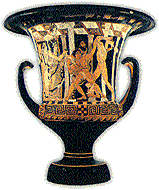
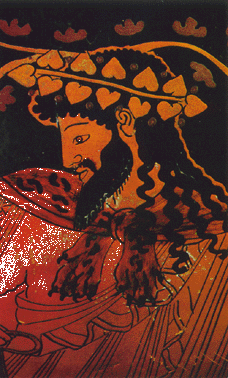

 t
t 